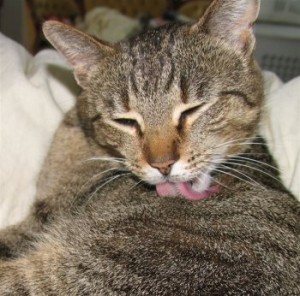Excessive Grooming in Cats
In many cases, our pets develop issues that need special attention and there may be signs of potential problems. One of these issues is apparent when you observe excessive grooming in cats.

Beluga
Cats must groom themselves. It’s a natural part of their behavior. However, under some conditions, cats can groom themselves excessively. While you may not think this is a serious issue, it can be. If you notice excessive grooming in your cat, pay attention. They will vomit hairballs more often. In any case, try not to let it go on too long. The cat can end up with bald or red spots in certain areas of her skin, or an open sore.
Excessive grooming in cats can be linked to a lack of attention, boredom, insufficient grooming by the owner, and even separation anxiety. Many of us have a misconception that cats don’t need attention because they are aloof, independent, and free-spirited. That’s not the case. They may not be as needy as dogs but that doesn’t mean they don’t need attention and affection regularly.
If you notice your cat grooming too much, try distracting him or her, play a little bit. If the behavior then stops, you can attribute it to boredom and then you might help by providing more distractions. However, if the cat goes back to grooming right away take him or her to the vet as soon as possible. The vet can rule out parasites or a fungal infection. Your cat may be having an allergic reaction or could be suffering from an autoimmune problem. He or she can help treat the medical problems and can also assist you in stopping the behavior to prevent future medical issues. The vet might prescribe antihistamines, herbal calming remedies, and antianxiety medications that can help break the cycle and calm your cat.
While knowing what caused the behavior is not always necessary for effective treatment, it may help you to understand what brought about your cat’s obsession with excessive grooming. Changes in the environment and the resulting stress can sometimes be a cause. For example, if you have just added a new member to the family – feline, canine, or even human.
You won’t be able to tell from the behavior itself whether the cause is psychological or physical, but excessive grooming should definitely be discussed with your vet, especially if it accompanies other changes in your cat’s behavior, such as reduced energy levels.
The bottom line is that you should talk to your vet if your cat’s behavior disturbs you in anyway. Observe your cat and groom him or her yourself regularly. Being aware of any changes in your cats behavior can avoid difficult medical problems down the line.

